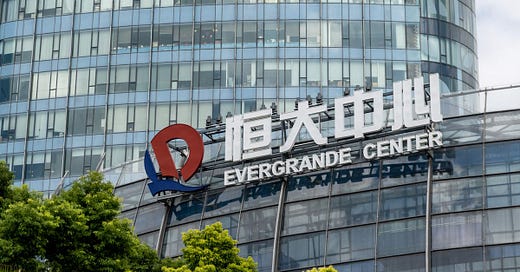Emerging Markets Daily - Sept 23
Evergrande Fall Chills Asian Markets, Egypt Issues Bond Ahead of Fed Taper, Turkey Rate Cuts, Taipei Protests China Air Incursion, The Rough Life of Global Gig Workers
The Top 5 Stories Shaping Emerging Markets from Global Media - Sept 23
China Signals Readiness for Evergrande to Fall; Asian Debt Markets Chilled
Wall Street Journal and Financial Times
“Chinese authorities are asking local governments to prepare for the potential downfall of China Evergrande Group, according to officials familiar with the discussions, signaling a reluctance to bail out the debt-saddled property developer while bracing for any economic and social fallout from the company’s travails.”
“The officials characterized the actions being ordered as ‘getting ready for the possible storm,’ saying that local-level government agencies and state-owned enterprises have been instructed to step in to handle the aftermath only at the last minute should Evergrande fail to manage its affairs in an orderly fashion.”
“They said that local governments have been tasked with preventing unrest and mitigating the ripple effect on home buyers and the broader economy, for example by limiting job losses—scenarios that have grown in likelihood as Evergrande’s situation has worsened.”
“Local governments have been ordered to assemble groups of accountants and legal experts to examine the finances around Evergrande’s operations in their respective regions, talk to local state-owned and private property developers to prepare to take over local real-estate projects and set up law-enforcement teams to monitor public anger and so-called ‘mass incidents,’ a euphemism for protests, according to the people.” Keith Zhai reports for the WSJ.
Meanwhile, the FT reports: “Deepening worries over Evergrande have ignited selling in a $428bn corner of the Asian debt market, underscoring how the crisis at the Chinese property developer is spreading to other assets as traders and investors brace for a crucial payment deadline on Thursday…”
“A failure to make an interest payment due on Thursday on one of its offshore dollar bonds could spark China’s biggest-ever debt restructuring. It would also mark the most severe shock to date across a market to which international asset managers had been enticed by lucrative returns as global bond yields sat near historic lows.” Thomas Hale and Hudson Lockett report for the FT.
Egypt Joins EM Bond Rush to Beat Fed Taper
Bloomberg
“Egypt will make its second Eurobond issuance of the year on Thursday, joining a rush of emerging markets governments taking advantage of low borrowing costs before the U.S. Federal Reserve starts tapering monetary stimulus introduced during the pandemic.”
“The offering includes 6-year notes at an initial yield of 6.125% as well as 12-year and 30-year bonds targeting yields of 7.625% and 8.875% respectively, according to a person familiar with the matter who asked not to be identified as they are not authorized to speak publicly.”
“The government hired JPMorgan Chase & Co., Citigroup Inc., HSBC Holdings Plc, First Abu Dhabi Bank and Standard Chartered to manage the transaction, and is seeking to raise $2.5 billion to $3 billion, two people familiar with the matter said.”
“Emerging-market bond sales are springing back to life as governments seek to raise money while it’s still cheap. The past week shattered a summer lull for dollar- and euro-denominated debt, bringing $36 billion of issuance from governments and companies after the previous 10 weeks saw only $90 billion raised. Sales from Indonesia, Turkey, Chile, Serbia and Hungary were all met with robust investor demand.”
“‘It makes sense to come now to the market to try to lock in lower rates ahead of the Fed’s soon-to-start tapering,’ said Mohamed Abu Basha, head of macroeconomic research at Cairo-based investment bank EFG Hermes. ‘Appetite is still good for high-yielding issuers.’ Mirette Magdy reports.
Markets Search in Vain for Logic as Turkey Cuts Rates
Istanbul Blog of bne IntelliNews
“A search in vain for monetary logic was under way in Turkey on September 23 as the Turkish central bank cut its policy rate by 100bp to 18%. The widely held suspicion was that the move was directly ordered by Turkish President Recep Tayyip Erdogan, despite there being no conventional logical grounds for it.”
“The move flew in the face of the market consensus—all but one of 23 economists surveyed by Bloomberg predicted the monetary policy committee (MPC) led by Turkish central bank governor Sahap Kavcioglu would keep the policy rate at 19%, unsurprising given official annual inflation unexpectedly climbed to 19.25% last month, pushing the Turkish lira’s yield when adjusted for inflation below zero for the first time in nearly a year…”
“Following the announcement (which you could term a ‘surprise,’) but these ‘surprises’ have become rather routine in Turkey in recent years, with Erdogan having fired three central bank governors within 20 months over policy differences), the USD/TRY pair saw TRY8.8016 before easing back into the 8.70s. The current all-time weakest rate remained at 8.8061, registered on June 25. As of 19:20 Istanbul time, the rate was 8.7637.” Akin Nazli reports.
Geopolitics: Taipei Protests China Military Air Incursion
Nikkei Asia
“Twenty-four Chinese military aircraft entered Taiwanese airspace Thursday, according to Taiwan's defense ministry, less than a day after Taipei announced its bid to join the Comprehensive and Progressive Agreement for Trans-Pacific Partnership.”
“The incursions into Taiwan's southwestern air-defense identification zone included 14 Shenyang J-16 fighter jets and two Shaanxi Y-8 planes. This latest shot across the bow came as China, which considers Taiwan a breakaway province, said Thursday it ‘strongly opposes’ Taipei's independent application to join the regional trade pact.”
“China formally applied to join the CPTPP last week. Taipei's independent application to join the regional trade pact. China formally applied to join the CPTPP last week.”
“Taiwan's foreign ministry condemned the incursions by Chinese aircraft. The Chinese government already bullied Taiwan for its bid to join the CPTPP and threatened Taiwan with massive air force harassment,’ despite Chinese President Xi Jinping's claim in his United Nations speech that Beijing ‘has never and will never invade or bully others,’ the ministry said in a statement.”
“China ‘has never ruled Taiwan a single day and has no right to speak on behalf of Taiwan in international space,’ the statement said. Chinese incursions around Taiwan have been a regular occurrence since late last year in response to not only moves by Taipei itself but also shows of support from countries such as the U.S.” Yu Nakamura reports.
Global Gig Workers Are Uncertain, Scared, and Barely Scraping By
Rest of World
“In Seoul, food delivery apps compete to get your meal to you at ‘bullet speed,’ sending drivers like Jang Hyuk hurtling across the city, racing against the clock on routes pre-planned by an algorithm. It’s the same in Bogotá, where Venezuelan migrant Lisandro Linarez braves the weather, the crime, and the occasional angry dog for $9 a day, if he’s lucky, working for delivery super app Rappi.”
“Digitally-mediated gig work has surged over the past decade. The International Labor Organization counted 489 active ride-hailing and delivery platforms worldwide in 2020, ten times the number that existed in 2010. The fluid nature of the workforce means there are few consistent estimates to how many people are now engaged in this kind of labor, but some researchers believe that as much as 10% of the global workforce now engages in some kind of gig work.”
“While the “sharing economy” model really began to take off in the U.S., gig work platforms are now global, adapting their models — or not — for wholly different contexts. To try to understand how this kind of work is experienced outside of the West, Rest of World spoke to platform workers around the world.”
“Through a survey of more than 4,900 workers, conducted in partnership with the research company Premise, and interviews with dozens more workers, we have tried to capture their experiences. We found great commonalities: Gig work is stressful and fragile; it pays relatively well, but it also costs workers a lot in fuel, data, and insurance. Workers, whether driving a taxi in Ethiopia or a truck in Indonesia, don’t feel they can turn down gigs, meaning that it’s rarely as flexible as the companies make out.”
“The common issues that gig workers face, whether in Manhattan or Mumbai, Johannesburg or London, is spurring the creation of a truly global movement, as drivers and riders link up across borders, pressuring companies and governments to recognize one simple fact: Gig work is work, and it needs to be paid as such.” Rest of World reports.
See Also the Emerging World column by Afshin Molavi on gig work and the motorcycle delivery driver - “Why the Motorbike Delivery Driver is a Symbol of Our Times.”
“Until the lions have their own historians, the history of the hunt will always glorify the hunter.” - Chinua Achebe, Nigerian novelist and poet




